
Zhang Sanfeng refers to a legendary Chinese Taoist who many believe invented T'ai chi ch'üan. However, other sources point to early versions of Tai Chi predating Sanfeng. He was purported to have achieved immortality.

Yang Yuhuan, often known as Yang Guifei, and known briefly by the Taoist nun name Taizhen (太真) was the beloved consort of Emperor Xuanzong of Tang during his later years. She is known as one of the Four Beauties of ancient China.

The Wudang Mountains consist of a mountain range in the northwestern part of Hubei, China, just south of Shiyan. They are home to a famous complex of Taoist temples and monasteries associated with the Lord of the North, Xuantian Shangdi. The Wudang Mountains are renowned for the practice of Tai chi and Taoism as the Taoist counterpart to the Shaolin Monastery, which is affiliated with Chinese Chán Buddhism. The Wudang Mountains are one of the "Four Sacred Mountains of Taoism" in China, an important destination for Taoist pilgrimages. The monasteries such as the Wudang Garden were made a UNESCO World Heritage Site in 1994 because of their religious significance and architectural achievement.
Moy Lin-shin was a Taoist monk, teacher and T'ai chi instructor who founded The Taoist Tai Chi Society (道教太極拳社), the Fung Loy Kok Institute of Taoism and the Gei Pang Lok Hup Academy.
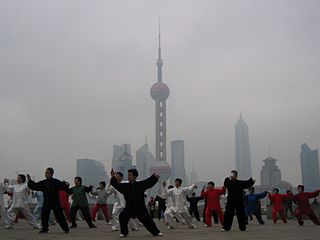
There are hundreds of different styles of Chinese martial arts, each with their own sets of techniques and ideas. The various movements in kung fu, most of which are imitations of the fighting styles of animals, are initiated from one to five basic foot positions: normal upright posture and the four stances called dragon, frog, horse riding, and snake. The concept of martial arts styles appeared from around the Ming dynasty (1368–1644). Before the Ming period, martial skills were commonly differentiated mainly by their lineage. There are common themes among these styles which allow them to be grouped according to generalized "families", "fractions", "class", or "schools" of martial art styles. There are styles that mimic movements from animals, or otherwise refer or allude to animals or mythical beings such as dragons, and others that gather inspiration from various Chinese philosophies or mythologies. Some deeply internal styles tend to focus strongly on practice relating to harnessing of qi energy, while some more-conspicuously external styles tend more to display skills and abilities in competition or exhibition.

Yang Mi is a Chinese actress and singer. She made her acting debut in historical television series Tang Ming Huang, and later received recognition for her leading roles in various television series such as Wang Zhaojun (2007), Chinese Paladin 3 (2009), Palace 1(2011), Beijing Love Story (2012), Swords of Legends (2014), The Interpreter (2016), Eternal Love (2017) and Legend of Fuyao (2018); as well as films Mysterious Island (2011), Tiny Times (2013–2015), and The Witness (2015). In 2017, she won the Best Actress award at the WorldFest Houston International Festival for her performance in Reset (2017).

Vincent Zhao Wenzhuo, sometimes credited as Vincent Chiu or Chiu Man-cheuk, is a Chinese actor and martial artist. Zhao is best known for playing the Chinese folk hero Wong Fei-hung in the Once Upon a Time in China film and television series and for his films The Blade, True Legend and God of War.

Louis Fan Siu-wong is a Hong Kong actor and martial artist. He is best known worldwide for his starring role as Ricky in Riki-Oh: The Story of Ricky (1991) and as Jin Shanzhao in Ip Man (2008) and Ip Man 2 (2010), as well as roles in numerous television series produced by TVB.

The Legend and the Hero 2 is a Chinese television series adapted from the novel Fengshen Yanyi written by Xu Zhonglin and Lu Xixing. The series was first broadcast on TTV from September to October 2009, and was preceded by The Legend and the Hero in 2007.

Kung Fu Cult Master is a 1993 Hong Kong wuxia film adapted from Louis Cha's novel The Heaven Sword and Dragon Saber. Directed by Wong Jing, it featured fight choreography by Sammo Hung, and starred Jet Li, Sharla Cheung, Chingmy Yau and Gigi Lai in the lead roles.

All Men Are Brothers is a 2011 Chinese television series adapted from Shi Nai'an's 14th century novel Water Margin, one of the Four Great Classical Novels of Chinese literature. The series is directed by Kuk Kwok-leung and features cast members from mainland China, Taiwan and Hong Kong. The series was first broadcast on 8TV in March 2011 in Malaysia.
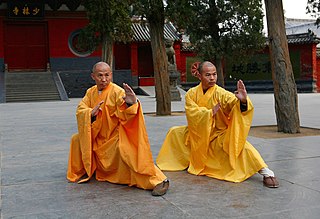
Wudang quan is a class of Chinese martial arts. In contemporary China, Chinese martial arts styles are generally classified into two major groups: Wudang (Wutang), named after the Wudang Mountains; and Shaolin, named after the Shaolin Monastery. Whereas Shaolin includes many martial art styles, Wudangquan includes only a few arts that use the focused mind to control the body. This typically encompasses taijiquan, xingyiquan and baguazhang, but must also include Baji chuan and Wudang Sword. Although the name Wudang simply distinguishes the skills, theories and applications of the internal arts from those of the Shaolin styles, it misleadingly suggests these arts originated at the Wudang Mountains. The name Wudang comes from a popular Chinese legend that incorrectly purports the genesis of taijiquan and Wudang Sword by an immortal, Taoist hermit named Zhang Sanfeng who lived in the monasteries of Wudang Mountain.
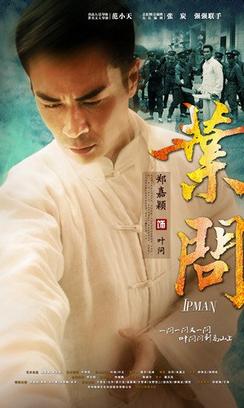
Ip Man is a 2013 Chinese television series romanticizing the life of Ip Man, a Chinese martial artist specialising in Wing Chun.

Taoism is a East Asian religion founded in ancient China with many schools or denominations, of which none occupies a position of orthodoxy and co-existed peacefully. Taoist branches usually build their identity around a set of scriptures, that are manuals of ritual practices. Scriptures are considered "breathwork", that is "configurations of energy" (qi), embodiments of "celestial patterns" (tianwen), or "revelations of structures" (li).
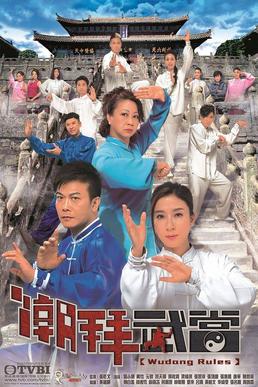
Wudang Rules is a 2015 Hong Kong martial arts, action themed television drama created and produced by TVB, starring Chin Siu-ho, Tavia Yeung, Yuen Qiu, Timmy Hung, Derek Kok and Toby Leung as the main cast. Filming took place from August until October 2014. The drama began airing on Hong Kong's Jade and HD Jade channels from May 25 until June 19, 2015 every Monday through Friday during its 8:30-9:30 pm timeslot with a total of 20 episodes.

Legend of Fuyao is a 2018 Chinese television series based on the novel Empress Fuyao by Tianxia Guiyuan. It stars Yang Mi and Ethan Juan. The series aired on Zhejiang TV from June 18 to August 13, 2018.
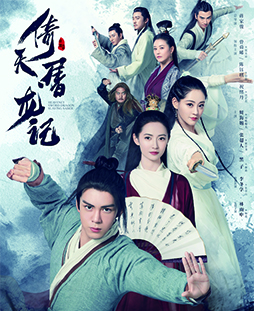
Heavenly Sword and Dragon Slaying Sabre is a 2019 Chinese wuxia television series adapted from the novel The Heaven Sword and Dragon Saber by Jin Yong. Originally published in newspapers from 1961 to 1963, the story has been revised twice; once in 1979 and the second in 2005. This remake is primarily based on the third edition of the novel. The series is the first adaptation to be released as a web series and was first broadcast on Tencent in China on February 27, 2019.
















